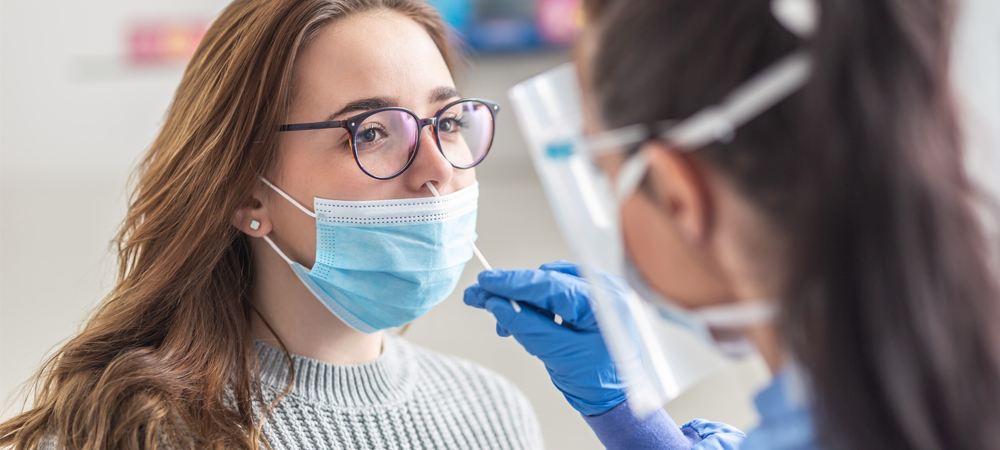
Are you ignoring cough, runny nose and fever, thinking it might be just a common cold, but what if it’s serious. We often notice these symptoms wondering if it might be a viral infection until its diagnosis. Respiratory Syncytial Virus (RSV) is a common virus that also refers to cold mainly because it shares similar symptoms. While it seems like a mild illness at first, it becomes dangerous for infants, the elderly, and those with weak immune systems. This is why it’s essential not to overlook these symptoms. However, all you need is to get an RSV nasal swab to ensure an accurate diagnosis, for a timely treatment.
This blog provides a clear, easy-to-understand guide to the RSV nasal swab test, including what it is, how it works, and why it’s essential in diagnosing RSV.
Respiratory Syncytial Virus (RSV)
Respiratory Syncytial Virus (RSV) is a highly contagious virus that causes respiratory infections by affecting the lungs and airways. Most people recover in a week or two, but RSV is sometimes quite severe. RSV is the general cause of bronchiolitis and pneumonia in children younger than one year of age in the United States.
In addition, RSV is prevalent in infants and young children, making it crucial for parents to stay alert to its symptoms. The Centers for Disease Control and Prevention (CDC) suggests every child will encounter RSV by the time they reach 2 years old. However, it’s important to note that while many children experience mild symptoms, a small percentage will develop more severe complications. With the rise of RSV concerns, it is crucial to take timely measures and test for RSV.
Symptoms of RSV
Symptoms may include:
- Cough
- Runny nose
- Fever
- Wheezing
- Difficulty breathing
If f your symptoms worsen or start to lead to breathing difficulties, consult medical attention immediately.
What is an RSV Nasal Swab?
An RSV nasal swab is a diagnostic test used to detect the presence of Respiratory Syncytial Virus (RSV) in a patient. The test involves collecting a sample of mucus from the nose using a soft, flexible swab. The nasopharyngeal swab for RSV detects antigens in the cells from the nose, helping to identify an infection. Antigens are substances in the virus that trigger the body’s immune system to produce antibodies. The test is generally accurate, with an 86.8% to 97% success rate.
It is crucial to get a test because RSV symptoms resemble a common cold, and it is hard to differentiate without proper testing. An RSV swab procedure is a quick, straightforward test which determines if someone contracts RSV.
How is RSV Nasal Swab Test Performed?
When it comes to the RSV swab procedure, there’s no need to worry. Here’s a simple breakdown of the RSV swab test collection:
Preparation:
You may be asked to sit in a comfortable position. For younger children, it might help to have someone hold them gently in place to ensure a smooth procedure. The healthcare provider will prepare you or your child for the test by explaining the process.
Swabbing:
You yourself or a healthcare provider will gently insert the swab into each of your nostrils. The swab is carefully rotated for several seconds to collect a sample of mucus from the nasal passages. This process may feel uncomfortable, but it’s quick and usually not painful.
Collection:
After swabbing, the nasal swab is placed into a liquid solution. This sample then goes to a lab for analysis or on-site testing using rapid testing methods.
Why is the RSV Nasal Swab Important?
The Nasal swab test is essential in diagnosing respiratory syncytial virus because its symptoms often overlap with those of other viral infections, such as colds and flu. However, early detection is crucial to identify the infection on time and promptly treat it. Here’s why a swab for RSV is essential:
- Prevents Complications: RSV leads to serious complications, especially in infants, older people, and those with weak immune systems. As a result, early detection helps healthcare providers manage infection and prevent severe conditions like pneumonia or bronchiolitis.
- Accurate Diagnosis: Since RSV symptoms resemble those of the common cold, flu, or other respiratory viruses, it’s difficult to diagnose based on symptoms alone. The RSV swab accurately determines if RSV is present, ensuring that patients receive the appropriate care.
- Limits the Spread: RSV is highly contagious and knowing whether someone is going through it helps limit the spread. Therefore, the RSV swab test helps identify who should distance themselves to avoid infecting others.
How long does the RSV swab test take?
If you’re wondering how long RSV nasal swab test takes, the time it takes to perform the test is quick. The actual swabbing process typically lasts less than a minute. However, the time it takes to get results depends on the type of test:
- Rapid RSV Swab Test: Results are available in as little as 15 to 30 minutes. This is often ideal for situations that require quick decision-making and immediate care.
- Lab-based RSV Swab Test: If the sample is sent to a laboratory, it may take a day or two to receive the results. While it takes longer, lab tests provide more accurate results.
Conclusion
The RSV nasal swab test is an invaluable tool in diagnosing RSV. It’s a quick, easy step that helps detect RSV and guiding healthcare providers in choosing the best course of action. The results offer essential insights into your health or that of your loved ones.
If you or someone you know is showing symptoms of RSV, consult Koch Research for an RSV nasal swab test. We will help you identify the virus and ensure you are guided towards proper treatment.






